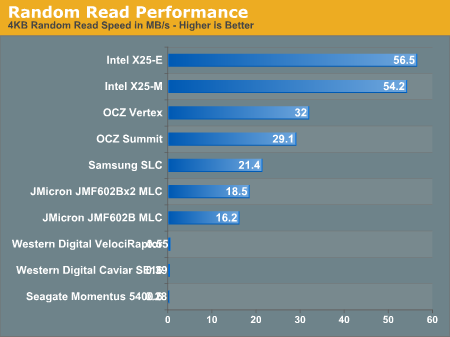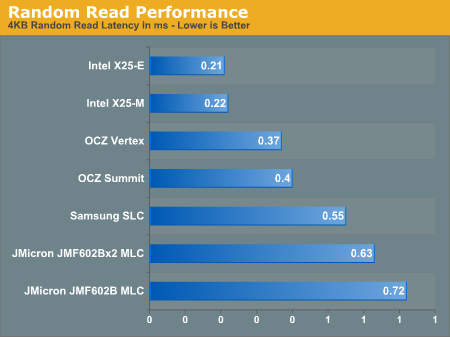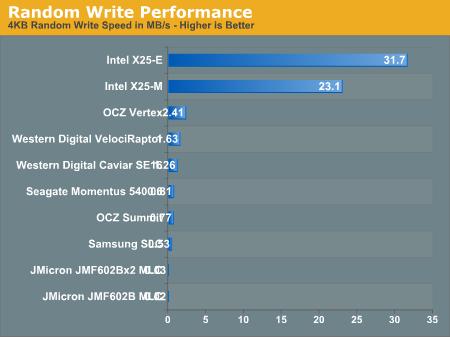The SSD Anthology: Understanding SSDs and New Drives from OCZ
by Anand Lal Shimpi on March 18, 2009 12:00 AM EST- Posted in
- Storage
Random Read/Write Performance
Arguably much more important to any PC user than sequential read/write performance is random access performance. It's not often that you're writing large files sequentially to your disk, but you do encounter tons of small file reads/writes as you use your PC.
To measure random read/write performance I created an iometer script that peppered the drive with random requests, with an IO queue depth of 3 (to add some multitasking spice to the test). The write test was performed over an 8GB range on the drive, while the read test was performed across the whole drive. I ran the test for 3 minutes.

The three hard drives all posted scores below 1MB/s and thus aren't visible on our graph above. This is where SSDs shine and no hard drive, regardless of how many you RAID together, can come close.
The two Intel drives top the charts and maintain a huge lead. The OCZ Vertex actually beats out the more expensive (and unreleased) Summit drive with a respectable 32MB/s transfer rate here. Note that the Vertex is also faster than last year's Samsung SLC drive that everyone was selling for $1000. Even the JMicron drives do just fine here.
If we look at latency instead of transfer rate it helps put things in perspective:

Read latencies for hard drives have always been measured in several ms, but every single SSD here manages to complete random reads in less than 1ms under load.
Random write speed is where we can thin the SSD flock:

Only the Intel drives and to an extent, the OCZ Vertex, post numbers visible on this scale. Let's go to a table to see everything in greater detail:
| 4KB Random Write Speed | |
| Intel X25-E | 31.7 MB/s |
| Intel X25-M | 23.1 MB/s |
| JMicron JMF602B MLC | 0.02 MB/s |
| JMicron JMF602Bx2 MLC | 0.03 MB/s |
| OCZ Summit | 0.77 MB/s |
| OCZ Vertex | 2.41 MB/s |
| Samsung SLC | 0.53 MB/s |
| Seagate Momentus 5400.6 | 0.81 MB/s |
| Western Digital Caviar SE16 | 1.26 MB/s |
| Western Digital VelociRaptor | 1.63 MB/s |
Every single drive other than the Intel X25-E, X25-M and OCZ's Vertex is slower than the 2.5" Seagate Momentus 5400.6 hard drive in this test. The Vertex, thanks to OCZ's tweaks, is now 48% faster than the VelociRaptor.
The Intel drives are of course architected for the type of performance needed on a desktop/notebook and thus they deliver very high random write performance.
Random write performance is merely one corner of the performance world. A drive needs good sequential read, sequential write, random read and random write performance. The fatal mistake is that most vendors ignore random write performance and simply try to post the best sequential read/write speeds; doing so simply produces a drive that's undesirable.
While the Vertex is slower than Intel's X25-M, it's also about half the price per GB. And note that the Vertex is still 48% faster than the VelociRaptor here, and multiple times faster in the other tests.










250 Comments
View All Comments
Franco1 - Wednesday, March 18, 2009 - link
I've been waiting a long time for this review. It was certainly worth the wait! I would love to see some benchmarks with 2+ drives in RAID configurations via onboard and add-on controller cards. Maybe another follow up?Howard - Wednesday, March 18, 2009 - link
Looks like the Vertex is the drive to get, especially once the user base expands a bit.MagicalMule - Wednesday, March 18, 2009 - link
Thanks for the article. Everyone is critiquing grammar and all this nonsense it seems, but I really enjoyed the article.It was very thorough and very informative.
Keep up the good work. =).
futrtrubl - Wednesday, March 18, 2009 - link
You missed out a VERY significant step that causes the greater part of the slowdown associated with your scenario. After the block is read out to cache the block has to be erased before it can be written to again and as you pointed out earlier an erase cycle, and thus the entire read/modify+erase/write cycle, takes a relatively LONG time, much longer than a simple read/modify/write.Edward
DrKlahn - Wednesday, March 18, 2009 - link
I've worked in IT for 15 years and have played with very fast arrays and know a fair amount about storage. 2 months ago I replaced my Raptor boot/gaming drive with a GSkill Titan. In day to day use I have no stuttering. The only stutter I have seen was while installing a large patch, surfing with multiple windows/tabs open and using Outlook. It wasn't even a second. I did align the partition, turned off drive indexing and defragmentation, and turned on caching. In day to day use it simply kills the Raptor. Games and applications load in a fraction of the time. Vista boot time has decreased dramatically.This isn't a case of purchase justification. If the drive was a dud I would have moved it to a secondary machine, reinstalled the Raptor, and chalked it up as a bad decision. I simply have not run into any scenario in daily use that it performs worse than the drive it replaced and I have not seen any real stuttering in daily use.
Gary Key - Wednesday, March 18, 2009 - link
I have a GSkill Titan drive also and really like it. However, my experiences while positive overall, do not compare with yours when it comes to stuttering (yes, all optimizations have been done to the drive and OS). I still have significant stuttering problems when using multiple IM programs and having multiple windows/tabs open at the same time. I literally have to wait a few seconds when texting colleagues if more than two conversations are occurring at the same time as the system pauses, hitches, and stutters in this scenario. It is especially aggravating when on Skype and trying to text, speak, and transfer files at the same time. This does not occur on the Intel drive in my testing. Apparently, it is no longer a problem on the OCZ Vertex or Summit drives. Except for my example above, I would certainly use the Titan drive over my Raptor any day of the week.druc0017 - Wednesday, March 18, 2009 - link
great article, keep up the good work, cant wait to see more updates, thxmikeblas - Wednesday, March 18, 2009 - link
Is the Velociraptor really "World's fastest hard drive", as this article states? Faster than the Hitachi SAS drives?Gary Key - Wednesday, March 18, 2009 - link
We have changed those statements to "...fastest consumer desktop hard drive...", that was the original intent of the statement, just clarified now. :)7Enigma - Wednesday, March 18, 2009 - link
I think the majority of us understood that. People just like to nit-pick.